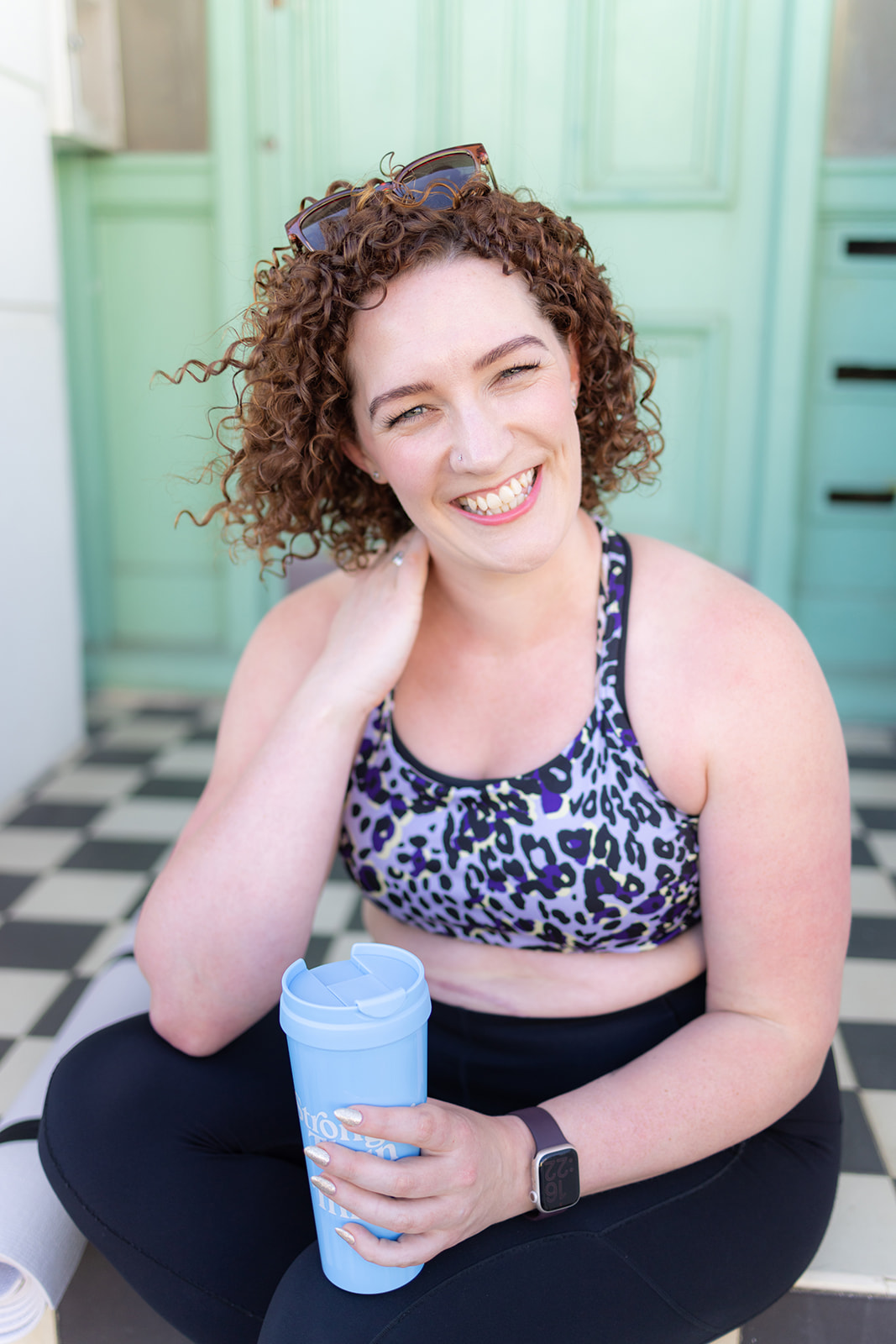Horsham-based personal trainer, Becky, holds a Level 4 Cancer Exercise certification. With an interest in one specialism – and her own cancer recovery journey informing her practice – comes a willingness to work with others. Becky finds herself increasingly supporting others in the rehabilitation of injuries and medical conditions. Here, she explains why she enjoys this type of work…
As is often the case, I was my own first client. A year after I first started exercising as an adult, I was diagnosed with a sarcoma (soft tissue tumour) which resulted in me having surgery. It wasn’t my first rodeo under the knife, so I knew roughly what I was in for with recovery, and got to work as soon as I could, because I’ve got a life to live.
Before I even received that diagnosis, I was working around a spinal fusion I’d had done aged 18, plus general preferences. When you’ve got the knowledge and confidence to figure out one process, you tend to throw yourself in when others ask, and whilst I’m not a doctor and know my boundaries, I’m also highly capable of working with someone, learning about their condition, and figuring out a way through it. These are some of the ways that shows up…
Helping people get their lives back
I’m often heard saying that successful treatment gives you your life back, but that medics don’t tend to support you in actually living it. Your mind and body are different, and there’s little guidance given on how to regain strength and confidence. There’s also a lot of disregard for the power of rehab, and what might be possible with it.
I make no guarantees when I start working with someone, but I do tend to have hope. If someone is willing to both work hard and be honest, then I’m very happy to try things out, make adaptations, and monitor progress. This method continues to serve my clients and me well – it’s got me back on long horse rides, a client back on his beloved road bike, and another client feeling the call of the ski slopes once more. It’s such a joy to be able to support people in returning to the things that they love.
Everything is a win
Even when someone isn’t training for competition, or a paid and professional athlete, there tends to be some sort of grand goal that the vast majority of people want to achieve via exercising. Whether it’s lifting a certain amount, accomplishing a specific physique, or the good old fashioned marathon run, these are things that take time and are a drawn out process of achievement.
For my rehab clients, upping their workout from three sets to four is massive. Progressing from holding on to a support whilst lunging, to being able to balance by themselves is significant. To actually be able to load a movement, rather than performing it simply using bodyweight is progress… and all of those plus more besides that I get to witness and cheer for on a daily basis. Instant gratification, moi?!
But seriously. Everything is a win when you start at square one. And I love that.
Creative thinking is needed
When I first started as a PT, working around injuries and preferences felt like a nightmare. I didn’t have the confidence or background to move beyond the classics, and think of different ways of skinning the proverbial cat.
Several years on, I have more experience, and panic less when someone says something like, “I can’t do anything that involves lying down” or, “I’ve got an Achilles issue”. Workarounds? I love them. Gyms have a variety of equipment for a reason, and I tend to find myself mostly residing near the cable machines (because they’re so adaptable) or our “functional” training area because, when someone doesn’t have the need for heavy loads, what’s actually often best is the simple stuff that just requires a bit of room to move in. Some of the stuff I do looks or sounds weird on the face of it. Then we get a few weeks down the road and everyone realises there was method to the apparent madness.
Speed is not important
I’ve never enjoyed the pressure of time-bound goals, unless it’s something that’s a good six months away. Please don’t ever come to me and tell me that you want to run 10km from the couch in six weeks! Unless you’re perhaps single, child-free, and don’t work.
Rehab generally takes time and patience. The gains are often slow and small. We’re working with a body which has struggled to survive, and the results can be unpredictable. And on top of that, life happens. You get a cold or a stomach bug and can’t train. You’re busy at work and so struggle for the time and energy to get to the gym. You go on holiday and rightly take time off. Our bodies dictate the pace, they have to, and our lives can also slow us down.
And that’s ok by me! Where’s the rush? We want to ensure that we make consistent progress, but does it all have to be done by next month? Rhetorical question, that.
Building a strong relationship
When you’re dealing with recovery, people more than ever tend to share their innermost thoughts and feelings. My clients know that I have my own experience to relate to, and will often raise topics that they don’t share elsewhere.
I’m not a therapist, but I can listen, and offer them the space to be heard. When someone trusts me in this way, I also know that they’ll give honest feedback on their sessions, and that means that I’m better able to do my job.
If you’re in the position of needing this kind of support, please get in touch, I’d love to chat about helping you.
